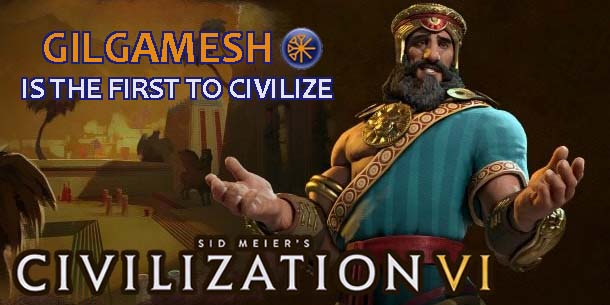
Sumer is one of the oldest civilizations known to have existed. The first permanent cities may have been settled along the Euphrates and Tigris rivers of Mesopotamia (modern day Iraq) as early as 5500 B.C., and written records date back as far as 3300 B.C.. The Sumerians were among the first adopters of agriculture, as the fertile floodplains of the "cradle of civilization" allowed for an abundance of food that enabled large, urban population centers.
Gilgamesh is an epic hero and king in Sumerian mythology. The Epic of Gilgamesh (transcribed in cuneiform on stone tablets) is the oldest surviving work of literature, and is credited as the world's first work of great literature. Copies of the poem were discovered in the ruins of the royal library of the Assyrian king Ashurbanipal. According to the epic poem, Gilgamesh was a demi-god who is best known for taming the wild, feral man Enkidu and forging a lasting friendship with him. The two adventured together many times before Enkidu was killed by the gods for defying their will and helping Gilgamesh to kill the sacred Bull of Heaven. The death of his friend sent Gilgamesh into depression, and he dedicated the rest of his life (according to the poem) to a futile search for eternal life. Scholars and historians originally dismissed Gilgamesh as a mythological figure, but archaeological finds suggest that he may have been a real historic king of Uruk sometime between 2800 and 2500 B.C.. Whether the stories are based on true events, or are purely myth, they can be seen as an allegory for civilization itself, which Sumer, and Gilgamesh, helped to establish.
DISCLAIMER:
Civilization VI is still very early in its life-cycle. Strategies for the game (and for specific leaders and civs) may change as Firaxis applies balance patches, introduces new features, or expands the game through DLC or expansion packs, or as the Civ community discovers new strategies. As such, the following strategy guide may change from time to time. I will try to keep it up-to-date, and will make notations whenever changes are made. I'll also post links in the official 2K forums and CivFanatics, where I'll also report any changes made. If possible and practical, I will try to retain the original content of the strategy for posterity.
I welcome any feedback or suggestions that readers wish to offer. Feel free to post on the linked forums, or by posting a comment at the bottom of the page.
This guide is up-to-date as of the December 2016 patch (ver. 1.0.0.56).
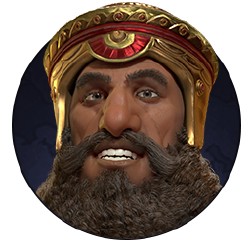
Gilgamesh might be a very good leader for beginners to the game. Gilgamesh encourages making friends and allies, and his uniques grant early game bonuses that will help new players get off to a good start. The bonus reward for clearing barbarian encampments will also help teach new players to build a sizeable early military and go hunting for barbarians, which is a good strategy for Civ VI in general, regardless of your leader or civ. So I recommend Gilgamesh as a good place to start, and he will be the subject of my first Civilization VI strategy guide! [More]
83c3f824-13a8-4896-8e42-7df26a0e763a|4|4.0
Tags:Sid Meier's Civilization, Civilization VI, Sumeria, Sumer, Gilgamesh, War Cart, Ziggurat, Adventures of Enkidu, Enkidu, Epic Quests, barbarian, outpost, tribal village, goody hut, warmonger, unique improvement, unique mounted unit, heavy calvary, horse, iron, donkey, science, culture, heavy chariot
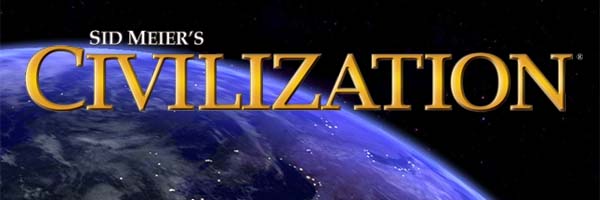
Recently, I brainstormed the possibility of redesigning Beyond Earth's winstates in order to support cooperative victories. With Civilization VI having been announced last month, I want to take some time to look at some different ways to approach victories in the mainstream Civilization games. Since Civilization III, there have been five victory types that have appeared in every mainstream Civ game:
- the military victory = kill or conquer everyone else
- the science victory = build a space ship to Alpha Centauri
- the culture victory = accumulate the most culture yield (usually through wonders)
- the diplomatic victory = vote for yourself to be leader of the United Nations
- the score victory = if no other victories are met by a certain number of turns, the civ with the highest score wins.
Earlier games had fewer victories (only military and space race), but there have been other victory types as well. Civ III and IV had a victory that simply required the player to occupy a majority of the map's land area and population (which could be achieved via military conquest and/or relatively peaceful expansion). I liked this victory type because it facilitated role-play by allowing me to grow my empire organically without having to feel like I was constantly meta-gaming for one of the other victories - just keep growing by whatever means are necessary or convenient. Civ IV also had a religious victory that required you to convert other players to your religion and then get them to elect you to be Pope or whatever. Civ: Revolution and the board game even included an economic victory in which you must accumulate a certain amount of wealth tokens. This was different than the "economic victory" of Civ V, in which you save up enough money to buy out the alliance of every city state on the turn before a U.N. election.
Civilization IV included a religious victory [LEFT], and the board game includes an economic victory [RIGHT].
These victories are intended to provide a direct path to victory using each of the major fundamental gameplay styles. But are there other methods?... [More]
a7731900-5994-464b-bc32-bb3d6884e093|1|5.0
Tags:Sid Meier's Civilization, Civilization, Civilization V, Civilization VI, victory, military, science, culture, diplomacy, religion, high score, economy, peace, war, cooperation, humanism, humanist, alliance, ideology, space race, United Nations, world wonder, agenda, leaders, Theodore Roosevelt, board game, victory point, Ed Beach, Sean Bean, E3, Settlers of Catan, The Sims 2, Sid Meier's Civilization the Board Game
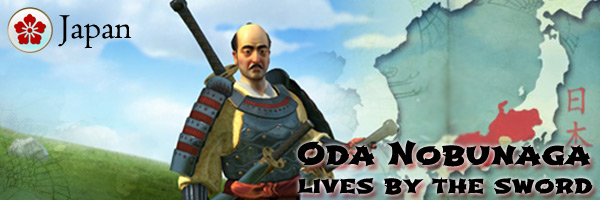
Continuing my series of strategy posts about Brave New World's modified civilizations, I'm going to take a look at strategies for Oda Nobunaga's Japan. Since Brave New World's Fall patch Japan was given additional buffs towards culture and coastal starts.
Japan is a series of four large island and numerous smaller islands that were formed by volcanoes. It has been inhabited since the upper paleolithic era (about 30 thousand years ago), and its people have lived in relative isolation for much of its history. It has gone through periods of war with its closest neighbors across the sea: China and Korea, and has had significant cultural influences from both, such native Shinto's two competing religions: Buddhism and Confucianism. Throughout most of Japanese history, the country has been in a feudal state, with regional populations being loyal to a warlord who is granted land and titles from the emperor (or "Shogun"). In-fighting between warlords was common, and power often ebbed and flowed between different clans and families.
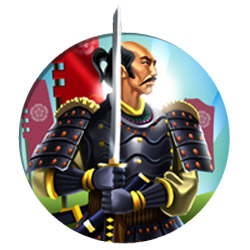
Samurai Daimyo Oda Nobunaga helped Ashikaga Yoshiaki to reclaim the title of Shogun for his clan in 1568, and Nobunaga used the leader as a puppet to enable his own conquests. He was a brutal warrior who once set fire to an enemy complex, killing tens of thousands of civilian non-combatants (including women and children) in order to put down a rebellion of farmers and monks. He eventually attained military control of more than half of the territories of Japan on behalf of the Shogun. His successor, Hashiba Hideyoshi, would complete the unification of Japan 11 years after political and personal tensions lead to Nobunaga's assassination by a vassal clan.
In the 19th century, Japan's isolation finally ended and it began the process of rapidly modernizing. By the 1930's, Japan had developed into a modern military-industrial machine that was almost the technological equivalent of the United States and European powers. It became the dominant power in the Pacific prior to being defeated by the United States in the second half of World War II. [More]
1cad9ae0-1148-4d92-80d2-cc7859222fda|3|5.0
Tags:Sid Meier's Civilization, Civilization V: Brave New World, Civilization V, Japan, Oda Nobunaga, Bushido, daimyo, shogun, Zero, culture, tourism, sea resources, fishing boats, sushi, longswordsman, fighter, warmonger, samurai, Civ V Fall Patch, Civ-V
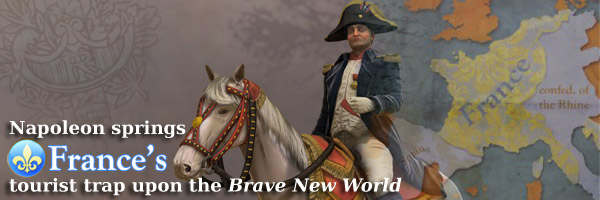
Now that I've finished my series of strategy posts about Brave New World's new civilizations, I want to take some time to look into some of the legacy civs that have received updates since Brave New World. France received a major revision in Brave New World out of the box, having its national trait completely redesigned, and one of its unique units was replaced with a powerful new unique improvement.
Humans have been occupying the land of France for at least 1.8 million years. The caves of Lascaux are a famous paleontological / archaeological site, as its cave paintings are some of the earliest and best-preserved examples of early human art and culture. After the fall of the Roman Empire, the region was split up between numerous Germanic tribes. One Germanic group, the Franks, eventually came to control most of the region, and this is where the term "France" was eventually derived. They set up the first French Kingdoms, which gained strength during the medieval periods despite threats from the Vikings and English. The European Enlightenment can trace many of its roots to the intellectual circles of France, which eventually culminated in the French Revolution that deposed and executed King Louis XVI and established a fledgling Republic.
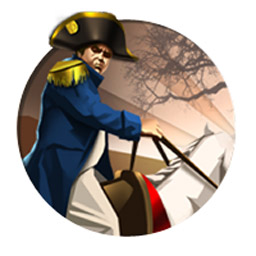
Napoleon Bonaparte seized control of this young Republic in 1799, eventually declaring himself the Emperor of France. He was a military genius of the time and an expert in the use of artillery. He conquered much of Europe from Spain all the way to Russia, and even fought campaigns in Africa (although these campaigns were not successful). His conquests helped to spread French culture, ideals, and reforms around the world, including widespread adoption of the metric system, new military traditions, and the Declaration of the Rights of Man. His armies eventually fell victim to the harsh Russian winters, which halted Napoleon's aggressions and forced a withdrawl. His reign eventually culminated in a devastating defeat at Waterloo (then part of the United Kingdom of the Netherlands). He was forced into exile on the island of Saint Helena, where he eventually died of stomach cancer in 1821.
One of Napoleon's nephews, Louis-Napoleon Bonaparte (Napoleon III), launched an enormous public works program in Paris in the mid 1800's in order to build hundreds of kilometers of wide boulevards and streets, replace the sewer system, construct parks, and be the first city in the world to install artificial lighting (originally oil-lit lanterns). This made Paris into the world's first "City of Light", allowing people to work and engage in recreational activities around the city during the night, eventually establishing a 24-hour culture and the urban nightlife.
[More]
9f3d3eec-89be-41a6-a1c0-4bd688440079|8|3.0
Tags:Sid Meier's Civilization, Civilization V: Brave New World, Civilization V, great work, theming bonus, luxury resource, Ancient Regime, France, unique improvement, Napoleon, City of Light, Chateau, Musketeer, Foreign Legion, Paris, tourism, culture, wonders, capital, Musketman, Civ-V
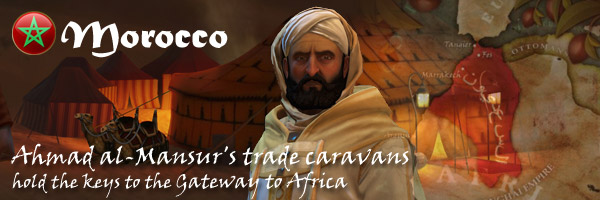
Continuing my series of Civilization V strategies, the fourth installation will cover the African trading empire of Morocco lead by Ahmad al-Mansur.
When the area of Morocco (north west Africa) was first inhabited about 100,000 years ago, the land was a fertile savannah, rather than the arid desert and mountains that it is today, and archeological remains of several Paleolithic proto human cultures exist in the region. During the classical era, Phoenicians established colonies on west Africa, and eventually it was conquered by Carthage and then Rome, and then by Muslim Arabs around 670 CE. The earliest independent Moroccan states were the Berber kingdoms which dates to at least 110 BC, and after the repulsion of Arab rule, the Berbers resumed control. Morocco was the first nation to recognize the United States as an independent nation, and their fleet protected U.S. merchant ships from assaults from barbary pirates. The friendship treaty with Morocco is the United States' oldest non-broken friendship treaty.
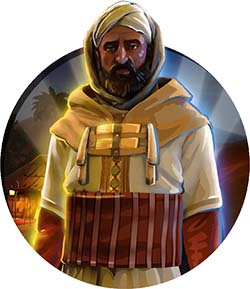
After the assassination of the Saadi Sultan Mohammed ash-Sheikh, his oldest son, Abdallah al-Ghalib sought sole rule, and Ahmad al-Mansur and his brother, Abd al-Malik, had to flee to the Ottoman empire. When Ahmad al-Mansur eventually gained control of Morocco, he resisted Ottoman annexation and maintained Morocco as an independent state, he established friendly relations with many Christian European nations, and began playing the Ottomans and Europeans against each other in order to secure his position of power. Later in his reign, he launched a military campaign against the Songhai empire, which had been weakened by civil strife. The campaign was successful, but Ahmad's heirs couldn't manage the vast territory that had been conquered, so it was divided into smaller kingdoms, and the Moroccan empire went into decline. Ahmad died of the plague in 1603
Morocco was the first civilization that I played in Civilization V: Brave New World. I chose them because their trait is very general-purpose and emphasizes the new trade route mechanic. [More]
35d6f741-18a8-4eb0-9140-07beeb3ea89c|8|4.9
Tags:trade, Sid Meier's Civilization, Civilization V: Brave New World, Civilization V, trade route, Morocco, Ahmad al-Mansur, Kasbah, Berber Cavalry, Gateway to Africa, caravan, cargo, cargo ship, culture, gold, unique improvement, cavalry, desert, Desert Warrior, Homeland Guardian, Civ-V
|

| 12 | | | | | | | 60 | | 11 | | | | | | | 55 | | 10 | | | | | | | 50 | | 09 | | | | | | | 45 | | 08 | | | | | | | 40 | | 07 | | | | | | | 35 | | 06 | | | | | | | 30 | | 05 | | | | | | | 25 | | 04 | | | | | | | 20 | | 03 | | | | | | | 15 | | 02 | | | | | | | 10 | | 01 | | | | | | | 05 |
|